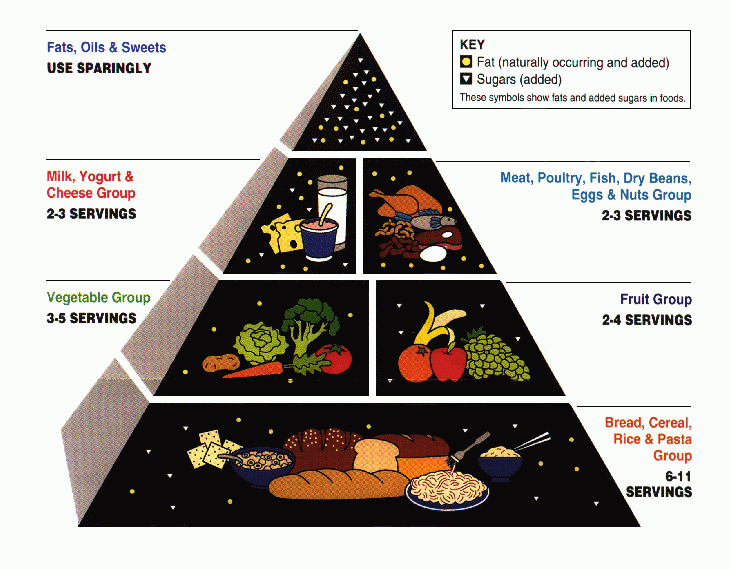
Proper Diet
To be healthy it is important to eat a balanced diet. Your body needs to be well fueled in order to perform at its best, after all. Eating a healthy diet has actually been shown to improve mental health and reduce instance of chronic and diet related disease, such as obesity and heart disease, while eating a poor diet, as mentioned earlier, increases the chances of a person contracting both. Eating a healthy diet may seem difficult, but it can be done by making sure to pay attention to what's in your food and how much of it you eat.
Calories
One thing you should keep track of when eating is how many calories you. What are calories? Calories are essentially a unit of energy. They measure the amount energy that your body can get from a food item. If you eat something that has 100 calories, then you get 100 calories of energy. If, say, you burn 100 calories, that means your body used the amount energy found in a 100-calorie food. If your body gets more energy than it needs, it stores the energy in your body as fat for later use. If your body does not get as much energy as it needs from outside sources, it uses the stored up fat in your body. Generally, you should eat as many calories as your body needs. If you consistently eat too many calories, your body will store too much fat, leading to weight gain, and in turn, obesity. Not eating enough calories will cause your body to burn stored fat for energy. Overtime this leads to weight loss, which can lead you to becoming underweight and your body to become too weak. So how many calories do I need to eat? A person's calorie needs depend on many factors; it varies for everyone, however the typical amount you should eat is around 1600-2400cal for women and 2000-3000cal for men. If you want to know more specifically, how many calories you should eat,look at this chart, which takes into account your age, sex,and activity level.How do I know how many calories are in my food. The best way to find out how many calories are in your food is look at the items nutrition label. It will usually say how many calories the item has on there. If your food is not packaged, and does not have a nutrition label, then you can just search the food's calorie content online.
Nutrients
Calories are not the only that you need to pay attention to when keeping a balanced diet, you need to keep track of what nutrients you are eating. Nutrients are essentially chemical compounds found in food that nourish your body. They are necessary for your body's survival. There are six major categories nutrients that your body needs to survive: carbohydrates, protein, fats, vitamins, minerals, and water. Carbohydrates, protein, and fats are macronutrients. They are called this because they are large and provide energy for the body. They are the energy nutrients. Carbs are the main fuel for your brain and muscles. Most of your body's energy supply should come from carbs, around 55%. Carbs are mostly found in grain products such as pasta, bread, rice, and also fruits and vegetables. Protein is also used as an energy source if carbs are running low, but it is mainly used to repair muscles, hair, red blood cells and also make hormones. Protein is mostly found in animal products such as milk, eggs, meat, as well as nuts. The third macronutrient, fat, though feared by many, is essential to the body. It maintains skin and hair, cushions organs, provides insulation, and is necessary for the body to absorb certain nutrients and create hormones. However, fats should not be more than 30% of your energy intake. Minerals and vitamins are both classed as micronutrients, since they are much smaller compared to macronutrients. Both micronutrients are only needed in small amounts but are still essential to the body. The body needs them for many things such regulating body functions, creating blood cells, or building bones. There are many different types of vitamins and minerals, which are found in all types of foods. You need to eat many different foods in order to get them all, so you should have a lot of variety in your diet. Water is the mostly commonly known nutrient and the most easily consumed, yet most people still do not get enough of it. You should consume around eight glasses of water per day. The reason water is so important for your body is that cells need it to function, it is used to cool the body, and it helps carry nutrients and waste through the body. Aside from drinking it directly, you can get water from other beverages such as juice, or get it from fruits and vegetables.

The Food Pyramid
So, you know about what nutrients you need to eat, but how do you know how much of them you need and what you need to eat get them. The easiest way to get the right amount of nutrients is to use the food pyramid. The food pyramid is an outline of what a person should eat each day to receive a healthy amount of nutrients. The pyramid shows how much you should eat from the five major food groups: grains (bread, cereal, rice, pasta), vegetables, fruits, dairy (yoghurt, milk, cheese), and protein (meat, poultry, fish, dry beans, eggs, nuts.Foods are grouped together because they provide similar amounts of the key nutrients of that food group. That way, eating from each food group will get you a healthy amount of each nutrient. In general, people should consume 6-11 servings of grains, 2-4fruits, 3-5 vegetables, 2-3 dairy, and 2-3 protein per day. This pyramid also shows another food group of fats and sweets. Any types of added sugars and fats in foods are parts of this food group. You should eat food from this food group sparingly, since eating too much fat is not good for you. Most Americans overindulge in this food group, so be wary of how many sweets you are eating.
To be healthy eater you do not need to follow these healthy eating requirements to a tee. You do not need to count the calories of everything you eat or eat a precise amount of protein each day. You should follow these eating suggestions generally. Just generally eat the right amount of calories each day, generally eat the right amount of each food group and you will much healthier.